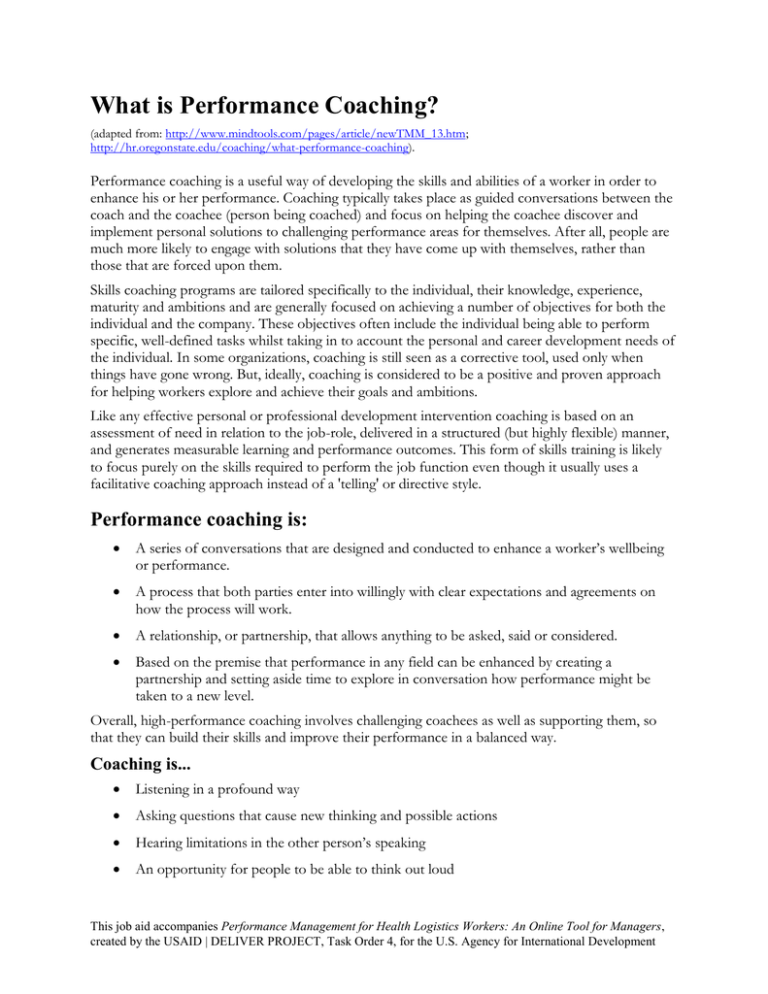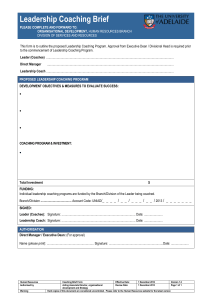What is Performance Coaching?
advertisement

What is Performance Coaching? (adapted from: http://www.mindtools.com/pages/article/newTMM_13.htm; http://hr.oregonstate.edu/coaching/what-performance-coaching). Performance coaching is a useful way of developing the skills and abilities of a worker in order to enhance his or her performance. Coaching typically takes place as guided conversations between the coach and the coachee (person being coached) and focus on helping the coachee discover and implement personal solutions to challenging performance areas for themselves. After all, people are much more likely to engage with solutions that they have come up with themselves, rather than those that are forced upon them. Skills coaching programs are tailored specifically to the individual, their knowledge, experience, maturity and ambitions and are generally focused on achieving a number of objectives for both the individual and the company. These objectives often include the individual being able to perform specific, well-defined tasks whilst taking in to account the personal and career development needs of the individual. In some organizations, coaching is still seen as a corrective tool, used only when things have gone wrong. But, ideally, coaching is considered to be a positive and proven approach for helping workers explore and achieve their goals and ambitions. Like any effective personal or professional development intervention coaching is based on an assessment of need in relation to the job-role, delivered in a structured (but highly flexible) manner, and generates measurable learning and performance outcomes. This form of skills training is likely to focus purely on the skills required to perform the job function even though it usually uses a facilitative coaching approach instead of a 'telling' or directive style. Performance coaching is: A series of conversations that are designed and conducted to enhance a worker’s wellbeing or performance. A process that both parties enter into willingly with clear expectations and agreements on how the process will work. A relationship, or partnership, that allows anything to be asked, said or considered. Based on the premise that performance in any field can be enhanced by creating a partnership and setting aside time to explore in conversation how performance might be taken to a new level. Overall, high-performance coaching involves challenging coachees as well as supporting them, so that they can build their skills and improve their performance in a balanced way. Coaching is... Listening in a profound way Asking questions that cause new thinking and possible actions Hearing limitations in the other person’s speaking An opportunity for people to be able to think out loud This job aid accompanies Performance Management for Health Logistics Workers: An Online Tool for Managers, created by the USAID | DELIVER PROJECT, Task Order 4, for the U.S. Agency for International Development Getting the most value and learning from an experience Acknowledging people for who they are and what they produce Generating possibility and keeping it alive A way of allowing people to change how they are relating to something A place to vent, experiment and play with ideas Confidential A supportive relationship A structure for making things happen Respectful of the coachee as an individual Respectful of the coachee's skills and goals in life Honest in the provision of constructive and challenging feedback, and setting high goals that the coachee is likely to achieve. Coaching is not... Giving advice, being the expert or having the answers Counseling Fixing people Doing it for them Policing or getting people to work harder A close, personal relationship A replacement for supervision or management





